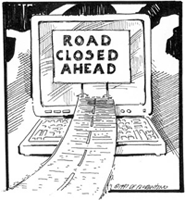WASHINGTON - Polls show that most people in the United States favor withdrawal of at least some troops from Iraq, and Bush's overall approval ratings are at record lows. Yet, when a few dozen House members gathered on Feb. 15 to talk about an exit strategy, they were consigned to a tiny, crowded room in a House office building, and charged that they are being denied a proper forum to air their views.
The House members opposed to the war say they have been stifled in the International Relations and Armed Services Committees and from offering legislation for debate on the House floor, reports the San Francisco Chronicle. "The nearest thing we have to a hearing is a pep rally for the administration's policies, so we are forced into a forum like this," said Rep. Lloyd Doggett, D-TX.
The hearing's star was Rep. Walter Jones, R-NC, a conservative who made headlines in June when he turned against the war he had initially supported and backed a resolution calling on Bush to devise a withdrawal plan. "I've taken some criticism for doing what I think is right," he said. "But if you don't do what you think is right, you're cheating the American people."
Other legislative efforts remain bottled up in the House, where the rules for debate are much more restrictive than in the Senate. On Sept.14, the International Relations Committee defeated a resolution calling for an investigation into the so-called Downing Street memos, leaked British government documents that indicated the Bush administration may have manipulated intelligence information about Iraq to justify a pre-emptive war.
In June, the House blocked a resolution from House Minority Leader Rep. Nancy Pelosi, D-CA, that would have directed Bush to lay out a plan that could lead to troop withdrawals.
The testimony before the ad hoc hearing focused on how the United States could gradually withdraw from Iraq without leaving chaos behind. David Mack, a former ambassador to the United Arab Emirates and now a vice president at the Middle East Institute, opposed an abrupt withdrawal, calling instead for "a new strategy for orderly disengagement." He and other witnesses suggested getting a high-ranking, non-American mediator involved in Iraq to work with the various ethnic and religious factions on a new constitutional settlement that could lessen insurgent attacks and bring Iraq back from the brink of civil war.
Rep. Charles Rangel, D-NY, sponsor of legislation to reinstate the military draft, said he knows of a sure-fire way to instantly bring the troops home from Iraq: "We could end this war overnight if we had a draft where everyone had to serve."




